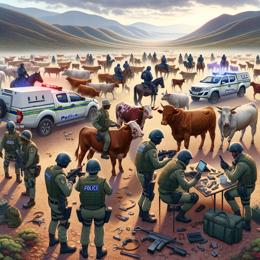Image created by AI
Balancing Act: South Africa's Struggle with Freedom of Expression Amidst Global Downturn
In the latest development surrounding civil liberties, South Africa faces a crucial juncture as the General Intelligence Laws Amendment Bill (Gilab) navigates through Parliament. Gilab envisages unsettling changes, notably the administrative vetting of individuals and agencies associated with national security, and a sweeping surveillance directive with minimal oversight. Key points of concern include the bill’s implications for media freedom—a cornerstone of any thriving democracy.
This worrying propensity to curb free expression and access to information is echoed globally, with a stark report from the Future of Free Speech project underlining a predominant restricting trend in 22 democracies. The oft-cited shields of national security and public welfare are leveraged to justify these constraints, spurring legislative additions like Gilab that may clash with constitutional safeguards.
The intricate challenge democracies face lies in discerning the intention behind laws that potentially impede free speech while pursuing ostensibly valid goals. South Africa has encountered this conundrum with several recent legal frameworks. The Protection of Personal Information Act, Cybercrimes Act, and the Prevention and Combating of Hate Crimes and Hate Speech Bill all raise intricate questions of balancing legitimate objectives with the inviolable right to free expression.
An encouraging counterpoint to administrative overreach is the South African Constitutional Court, lauded as a bulwark in safeguarding expressive freedoms. Last year's landmark acknowledgment of SLAPP suits—litigative tactics weaponized to silence dissenting voices—underscores the Court's resolute stance on protecting media rights. With three high-profile cases decrying the misuse of legal process against journalists, a precedent is set against such abuses.
Civil society's advocacy materializes through a proposed anti-SLAPP draft law, intending to fortify the voice of the less powerful against litigious intimidation. This initiative is a beacon of hope amidst growing apprehension, aligning with international efforts and celebrating the ethos that free expression requires proactive defense.
However, these judicial victories stand against the backdrop of an escalating global free speech recession, exacerbated during contentious times such as the Israel-Gaza conflict and looming elections. In the face of these pressures, 2023 could prove to be a defining year in the struggle to uphold dialogue and dissent, not just for South Africa, but for democracies worldwide.










